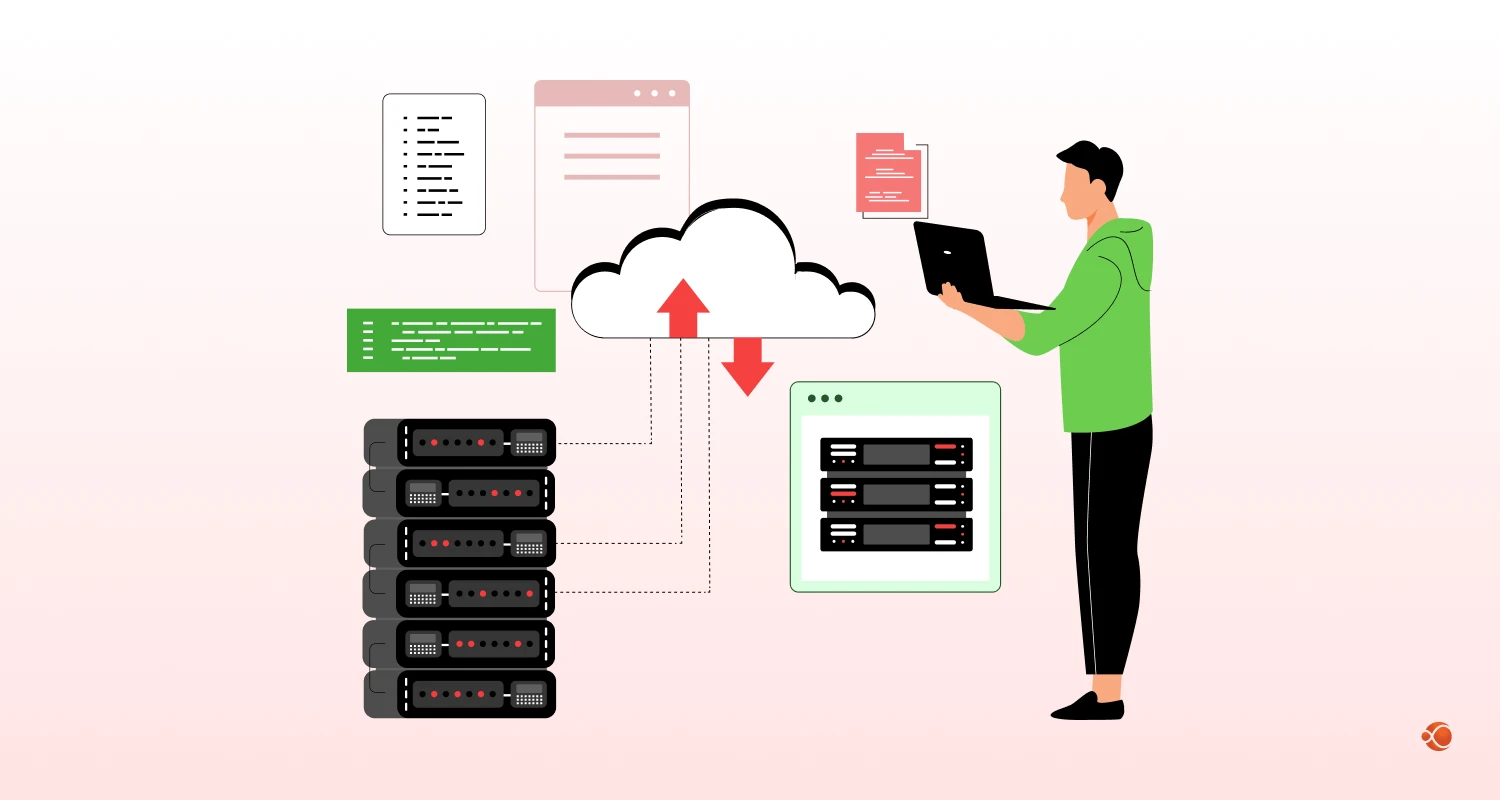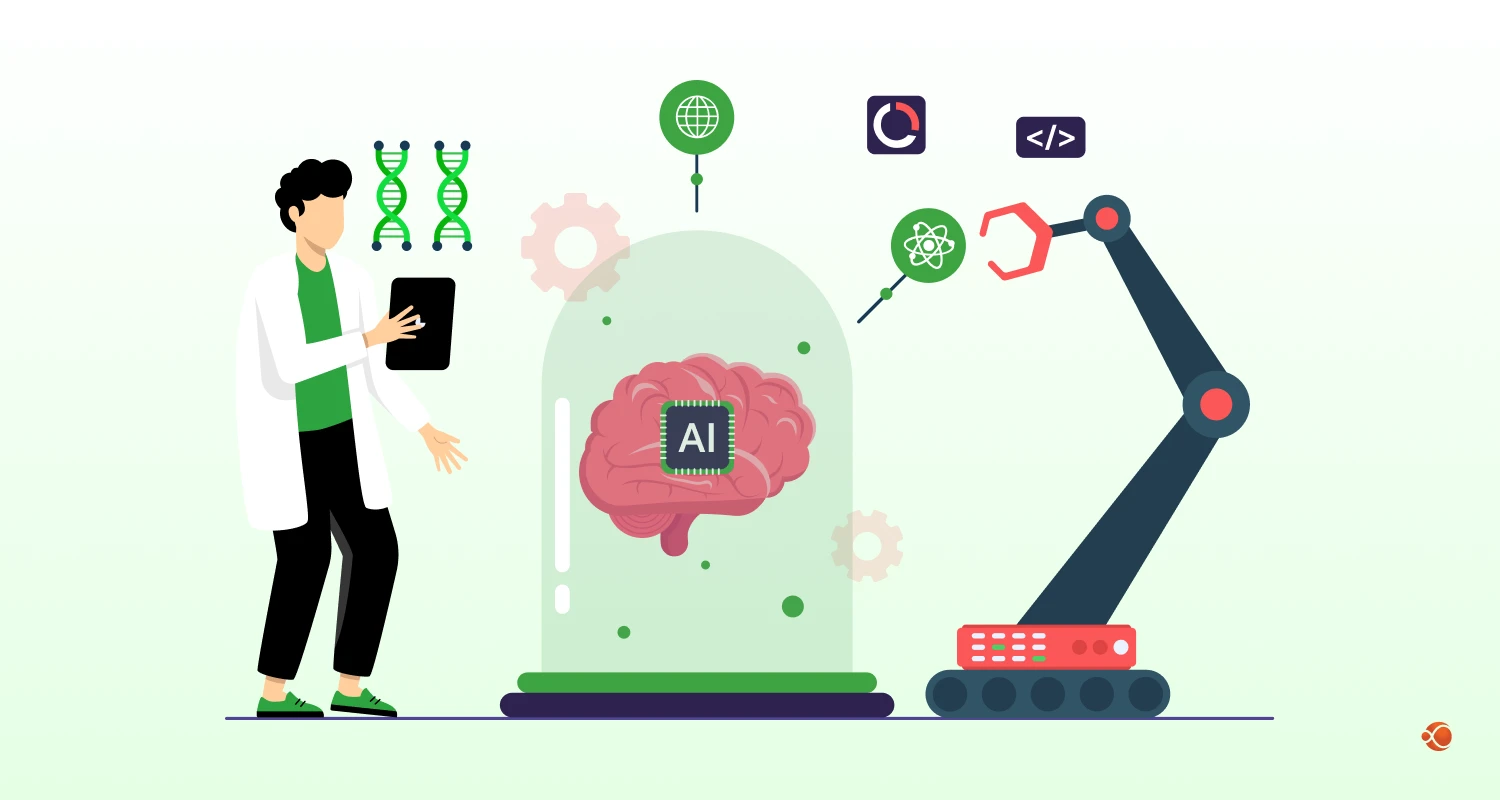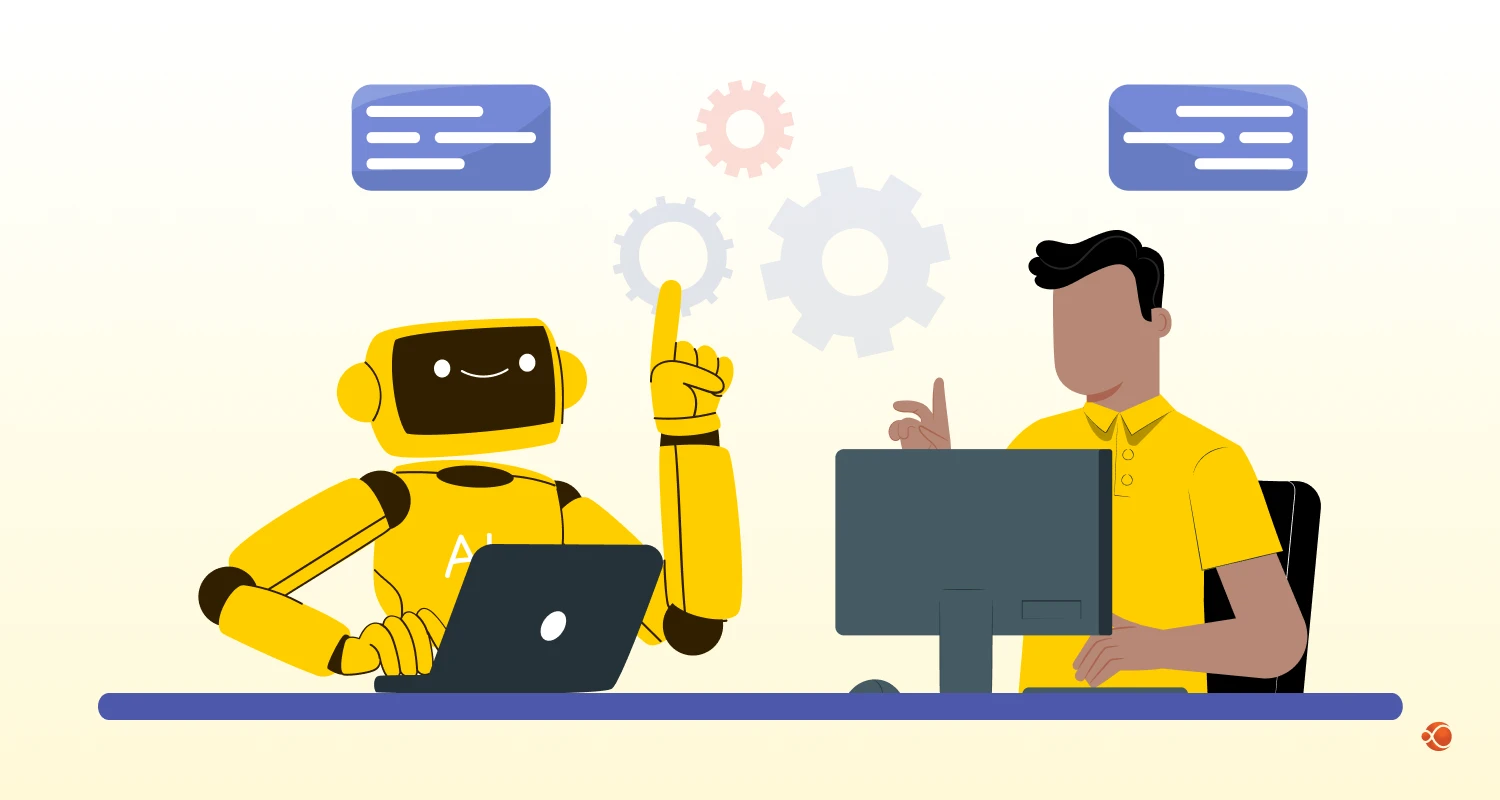Businesses are rapidly relying on artificial intelligence to enhance user experiences, automate processes, and gain competitive advantages. However, understanding AI app development cost remains one of the biggest challenges for companies planning to create artificial intelligence app solutions.
It is difficult to define AI requirements hence teams find it difficult to come with an accurate AI app development cost estimation. Unlike traditional app development, AI applications have additional considerations like data processing, machine learning model training, and specialized expertise requirements.
The AI app development cost estimates land around $30,000 USD for basic implementations to over $500,000 USD for enterprise-level AI applications. The reason behind this steep variation depends on multiple factors including project complexity, AI model requirements, and development approach.
This blog aims to cover every aspect of AI app development cost, so you know exactly what you need to build your AI driven app and how much budget you need to put aside for it.
The Rise of Artificial Intelligence Market: Reasons for Popularity
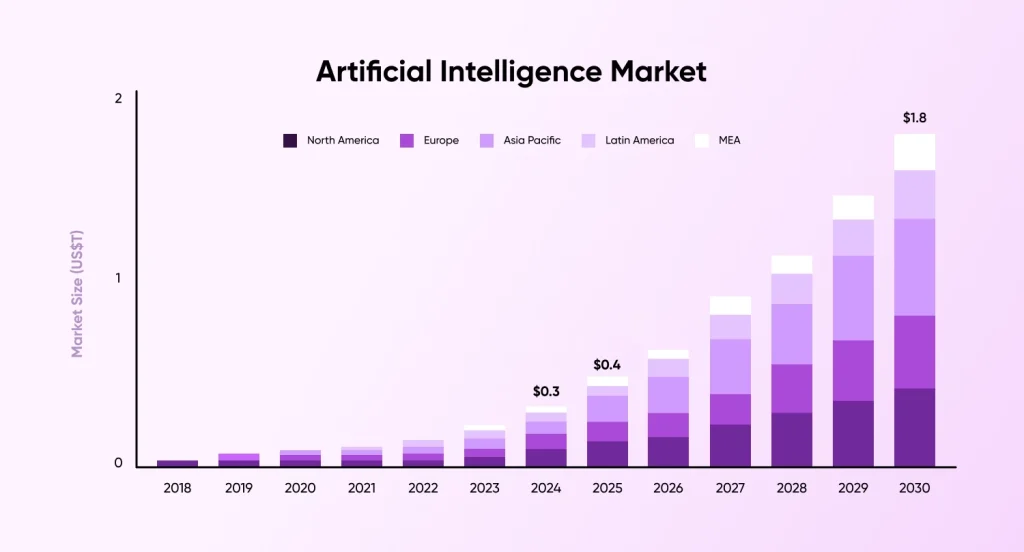
As per a recent industry report, the global Artificial Intelligence market will grow to USD 1.8 trillion by 2030. As per the study, the primary reasons behind the raise of AI growth in the recent years and coming years can be attributed to:
- Increased accessibility to historical datasets is accelerating the pace of AI innovation.
- The affordability of data storage and recovery is enabling large-scale data usage across sectors.
- Improvements in deep learning and artificial neural networks are expanding AI adoption across industries.
- Next-generation computing architectures are supporting faster development and deployment of AI models.
- Emerging computer vision technologies are enhancing AI capabilities in imaging and real-time analysis.
How to Conduct AI App Development Cost Analysis
AI development cost analysis is an end-to-end systematic process to determine the budget needed to build AI apps as per your project needs and urgency. This analysis is based on current market rates for AI developers, varying infrastructure costs, data requirements, and other factors affecting the overall AI app development budget.
This systematic approach can help businesses make informed decisions about their AI investments, while avoiding common budgeting pitfalls.
Here is a step-by-step AI app development cost analysis process:
Step 1: Understanding Your AI Requirements
For whatever new project you take on, your first question foremost should be what purpose does this serve? Are you building an AI app just to be relevant? Do you have an end-goal in mind? What are the AI functionalities, expected features, and data needed to make sure your AI app works as intended? You also need to define the scope of AI capabilities of your app and the integration complexity.
Step 2: Segmentation of AI Projects in Systematic Phases
When you think of any big-scale project all at once, it often can feel overwhelming and difficult to plan out. Hence dividing your AI project as per AI development lifecycle stages will provide much needed clarity for cost estimations and timeline requirements of the project. For instance:
| AI Project Phase | Key Activities | Estimated Time | Estimated Cost (USD) |
| Discovery & Planning | Requirement gatheringAI feasibility studyTechnology selectionArchitecture planning | 2–4 weeks | $8,000 – $25,000 |
| Design Phase | UI/UX designAI interaction designWireframingPrototype development | 3–6 weeks | $15,000 – $40,000 |
| AI Model Development | Data collection & preparationModel trainingAlgorithm developmentModel optimization | 6–16 weeks | $40,000 – $150,000 |
| App Development | Frontend developmentBackend integrationAPI developmentAI model integration | 8–20 weeks | $50,000 – $200,000 |
| Testing & Validation | AI model testingPerformance testingSecurity testingUser acceptance testing | 3–8 weeks | $15,000 – $60,000 |
| Deployment & Launch | Cloud deploymentServer configurationProduction setupGo-live support | 1–3 weeks | $5,000 – $20,000 |
| Maintenance & Updates | Model retrainingPerformance monitoringBug fixesFeature updates | Ongoing | $15,000 – $80,000/year |
Step 3: Evaluating AI Developer Hiring Requirements
Each project will require different kinds of AI developers and different numbers of developers working on the project. For a basic AI application, you probably would only need one or two AI developers to handle the entire integration, deployment and other requirements, however, for building a complex AI project you might need to create a dedicated development team with AI developers, machine learning engineers, data scientists and other such professionals. You need to consider their hourly rates in your specific AI domain and ensure they can collaborate with each other for seamless project completion. Here are the basic rates of different AI developer profiles:
| Role | Key Responsibilities | Hourly Rate (USD) |
| AI Developer | Build and integrate AI modelsImplement algorithms into applicationOptimize AI workflows | $50 – $120 |
| Machine Learning Engineer | Design and train machine learning modelsSelect algorithms and tune performanceEnsure scalability of ML pipelines | $60 – $150 |
| Data Scientist | Analyze large datasetsBuild predictive models and statistical analysisProvide insights for model refinement | $65 – $140 |
| Data Engineer | Design and manage data pipelinesClean, structure, and process raw dataMaintain data warehouses and ETL workflows | $55 – $130 |
| DevOps Engineer | Deploy and monitor AI systemsManage CI/CD pipelines and cloud infrastructureEnsure high availability and performance | $50 – $110 |
| UI/UX Designer | Design intuitive AI user interfacesImprove user interaction with intelligent featuresConduct usability testing and iterations | $40 – $90 |
Step 4: Choosing the Right AI Technology Stack
Building an AI project can feel overwhelming when you’re staring at the endless list of frameworks, libraries, and tools available today. The key is matching your technology choices to your specific needs your budget, timeline, team expertise, and most importantly, what you’re actually trying to build. Here is a proper breakdown of popular AI technologies so you have a better idea of what AI methods and platforms would best suit your needs.
When to Choose –
Machine Learning:
If you’re working with structured data and need to make predictions or classifications, traditional machine learning development services are often your best bet. Think customer segmentation, fraud detection, sales forecasting, or recommendation engines.
Popular ML Tools: Scikit-learn, XGBoost, LightGBM, H2O.ai, Google Cloud AutoML
Deep Learning (DL):
Unstructured data is deep learning’s playground. Images, audio, video, complex text analysis if humans can look at it and understand it, deep learning can probably learn to do it too.
Popular DL Tools: TensorFlow, PyTorch, Keras, JAX, DeepSpeed
Natural Language Processing:
The transformer revolution (think ChatGPT, BERT) has completely transformed NLP. You can now build sophisticated language applications without training models from scratch. It is ideal to build chatbots, conduct sentiment analysis, summarize documents, generate content, create AI-based search systems, and more human language use cases.
Popular NLP Tools: Hugging Face Transformers, spaCy, NLTK, OpenAI API, AllenNLP
Computer Vision:
Common use cases for computer vision include retail analytics, medical imaging, autonomous vehicles, quality control, security systems. If it involves understanding what’s in an image or video, you’re in computer vision territory.
Popular NLP Tools: OpenCV, YOLO, Detectron2, MediaPipe, MMDetection
Generative AI:
One of the most used AI methods in day-to-day life. It can be used for content generation, code generation, image synthesis, design automation, creative writing and more. Find a reliable generative AI solutions company that captures the “AI magic”.
Popular Gen AI Tools: OpenAI (ChatGPT, DALL·E), Midjourney, Claude, RunwayML, Stable Diffusion, Jasper
Reinforcement Learning:
Dynamic decision-making problems where the optimal strategy isn’t obvious upfront. Think game playing, robotics, real-time optimization, and autonomous systems. However, many companies implement RL without needing it, so you should make sure to consult with a dedicated AI software development services company before committing to reinforcement learning.
Popular Reinforcement Learning Tools: OpenAI Gym, Stable Baselines3, RLlib, PettingZoo, DeepMind Acme
Step 5: AI App Infrastructure and Data Planning
Plan for the technical backbone of your AI project by estimating all infrastructure-related costs. This includes:
- Cloud computing (AWS, Azure, GCP)
- GPU or TPU instances for model training
- Data storage, bandwidth, and pipelines
- Third-party AI API usage (OpenAI, Hugging Face, etc.)
Also consider long-term costs like monitoring, scaling, and compliance if handling regulated data. Proper infrastructure planning avoids deployment delays and keeps operational costs predictable.
Step 6: Comprehensive AI App Development Cost Estimation
Build a full cost profile covering all project needs. Include:
- Developer and specialist hourly or monthly rates
- Infrastructure, software, and licensing fees
- Design, QA, DevOps, and project management costs
- Model retraining and iteration sprints
Also make sure to consider variable expenses such as usage-based APIs or increased compute requirements during peak demand. Also add a 10-20% buffer in AI software development cost to cover unforeseen scope changes and delays.
Benefits of AI App Development Cost Analysis
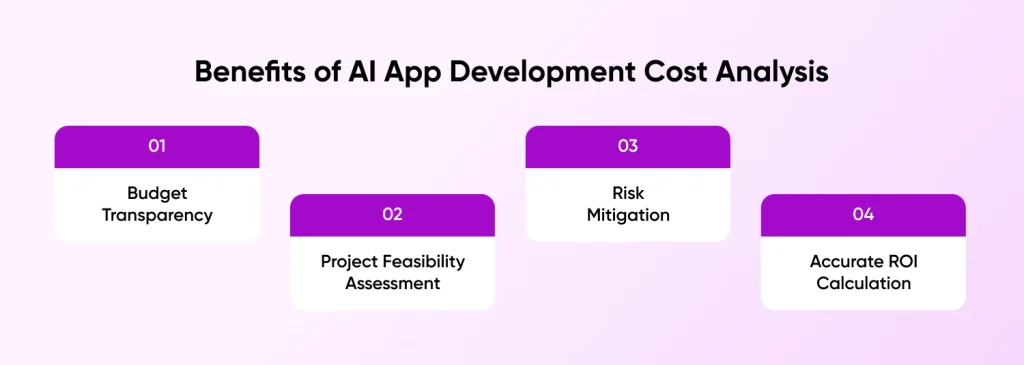
1. Budget Transparency
A detailed cost to make an app gives you a clear picture of where your AI development funds are going. This aids you stay on track financially and avoid any surprise expenses along the way.
2. Project Feasibility Assessment
By analyzing AI software costs upfront, you can see whether your AI project fits within your available resources and whether it’s likely to deliver a worthwhile return on investment.
3. Risk Mitigation
Identifying potential budget overruns early allows you to plan ahead and put measures in place to reduce risks tied to the complexities of AI model training and development.
4. Accurate ROI Calculation
When you have a good handle on both projected costs and anticipated benefits, it becomes much easier to calculate ROI and evaluate the project’s long-term value.
Major AI App Pricing Factors in 2026
Knowing factors that affect the cost of AI app development helps you plan better and avoid unexpected expenses. Since a lot of these factors are connected and can get complicated, it’s worth talking to a trusted AI consulting services company. They’ll guide you through the process, help you make informed decisions, and ensure your project stays on track and within budget.
1. AI Application Type and Complexity
The type of AI app you’re building plays a big role in determining development costs. For example, AI chatbot development is relatively inexpensive since they don’t require much machine learning expertise. On the other hand, building more advanced autonomous AI systems can get costly. These systems need complex algorithms, large datasets for training, and sometimes even specialized hardware to run efficiently.
Cost Breakdown by Application Type:
| AI App Type | Average Cost Range (USD) | Key Complexity Factors |
| Simple Chatbot | $15,000 – $50,000 | Pre-trained models, basic NLP |
| Recommendation Engine | $25,000 – $80,000 | User behavior analysis, collaborative filtering |
| Image Recognition App | $40,000 – $120,000 | Computer vision, model training |
| Voice Assistant | $60,000 – $150,000 | Speech processing, context understanding |
| Predictive Analytics Platform | $80,000 – $200,000 | Statistical modeling, data pipeline integration |
| Computer Vision System | $100,000 – $300,000 | Deep learning, real-time processing |
| Autonomous AI System | $200,000 – $500,000+ | Multi-modal AI, safety-critical algorithms |
| Enterprise AI Platform | $300,000 – $1,000,000+ | Scalable architecture, enterprise integration |
2. Geographic Location of AI Development Team
Geographic location remains one of the most significant cost variables in AI development. The global distribution of AI talent creates substantial rate differences, though the gap is narrowing as remote work becomes standard and emerging markets develop stronger AI capabilities.
North American developers command premium rates since there is high demand and mature technology infrastructure. But Asian markets, especially countries like India offer competitive alternatives without compromising quality.
Here is AI app development pricing as per regions of AI developers:
Regional Cost Comparison:
| Location | Avg Cost to Build AI App (Annually in USD) | Hourly Rates | Key Considerations |
| North America | $120,000 – $200,000 | $80 – $200/hour | Premium talent, timezone alignment |
| Western Europe | $80,000 – $150,000 | $60 – $150/hour | Strong technical skills, GDPR expertise |
| Eastern Europe | $40,000 – $80,000 | $30 – $80/hour | Excellent technical education, cost-effective |
| India & South Asia | $25,000 – $60,000 | $20 – $60/hour | Large talent pool, English proficiency |
| Latin America | $35,000 – $70,000 | $25 – $70/hour | Timezone compatibility with US |
3. AI Model Training Cost and Complexity
The approach you take for AI model development significantly impacts your budget. Using pre-trained models offers the fastest time-to-market but may limit customization, while building models from scratch provides maximum control at considerably higher costs.
Model training complexity depends on data requirements, computational resources, and the complexity of algorithms. LLMs require massive datasets and considerable GPU resources which makes cloud-based training the only viable option for most organizations.
AI Model Development Cost Structure:
- Pre-trained Model Integration ($5,000 – $25,000): Leveraging existing models like GPT, BERT, or computer vision APIs. Includes integration time, API costs, and minor customization.
- Custom Model Fine-tuning ($20,000 – $80,000): Adapting pre-trained models to your specific use case. Requires domain-specific data collection and specialized expertise.
- Built-from-scratch Models ($50,000 – $200,000+): Complete custom development for unique requirements. Includes algorithm design, training infrastructure, and extensive testing.
- Large Language Models ($100,000 – $500,000+): Enterprise-scale language models requiring massive computational resources and specialized talent.
4. AI App Development Timeline and Urgency
Project timeline significantly impacts costs through resource allocation and priority management. Standard timelines allow for optimal resource utilization and thorough testing, while accelerated schedules require additional team members and potentially compromise thorough validation.
Rush projects often require premium rates to secure available talent and may necessitate parallel development streams that increase coordination complexity. Extended timelines, while allowing for better quality, can increase total costs through prolonged resource commitment.
Timeline Impact on Costs:
- Standard Timeline: Baseline cost with optimal resource allocation
- Accelerated Development: 25-40% cost increase due to additional resources and coordination overhead
- Rush Projects: 50-100% cost premium for immediate talent acquisition and parallel workstreams
- Extended Timeline: Higher total costs due to prolonged resource commitment and potential scope expansion

Cost to Build AI Applications Breakdown By Project Scale
Understanding project scale helps set realistic expectations for team size, timeline, and budget allocation. Each scale category has distinct characteristics and requirements that directly impact development costs.
| Project Scale | Cost Range (USD) | Team Size | Timeline | Complexity Level |
| Small Scale | $15,000 – $50,000 | 1-2 developers | 2-4 months | Basic integration |
| Medium Scale | $50,000 – $200,000 | 3-5 specialists | 4-8 months | Custom development |
| Large Scale | $200,000 – $500,000+ | 5-10+ team members | 8-18 months | Enterprise solution |
Small-Scale AI Projects ($15,000 – $50,000)
The cost to develop small-scale AI projects is naturally not as high as building a complex one. These projects mainly use pre-built APIs and need minimal custom model development. Hence, such scaled projects are ideal for startups or enterprises testing AI adoption for a specific use case. You can also opt for AI MVP development services of a trusted professional for this.
Typical Projects Include:
- Simple chatbots with pre-trained models
- Basic recommendation systems using collaborative filtering
- Image classification with existing APIs
- Simple voice commands for mobile apps
Medium-Scale AI Projects ($50,000 – $200,000)
Medium-scale AI projects typically involve developing custom models to meet specific business needs. Such AI projects demand a higher level of technical expertise.
Typical Projects Include:
- Advanced chatbots with natural language understanding
- Custom recommendation engines with behavioral analysis
- Computer vision projects
Large-Scale AI Projects ($200,000 – $500,000+)
Large AI projects are big, powerful systems that can change the way a business works. They take a lot of planning, use different types of AI tools, and need strong computer systems to handle heavy use. These projects are usually built to help a business grow, work faster, and make better decisions over time.
Typical Projects Include:
- Comprehensive AI platforms serving multiple business functions
- Advanced machine learning systems with continuous learning capabilities
- Multi-modal AI applications combining vision, language, and speech
- Enterprise-wide AI integration with existing systems
API-Based Generative AI Solutions
Most businesses start with API-based solutions due to lower upfront costs and faster implementation. However, usage-based pricing can become expensive at scale, making custom solutions more economical for high-volume applications.
Here are the Generative AI Pricing Models of Leading Gen AI Platforms:
Hidden Costs to Consider When Budgeting for AI App
1. Data Acquisition and Processing
For your AI to work well, it needs high-quality data. If the data you feed it is messy or wrong, your results will be too. In the worst case, you may have to start over and retrain the whole system which can be expensive. That’s why it’s important to plan for data-related costs early on.
Typical data costs include:
- Buying data: $10,000 to $100,000 if you’re using data from outside sources
- Cleaning and organizing data: $15,000 to $60,000 to make sure the data is accurate and ready to use
- Storing the data: $1,000 to $10,000 each month for reliable and scalable storage
2. Technology and Computing Requirement
AI needs a lot of computing and processing power, especially when it’s being trained or handling a lot of requests at once. If you’re using cloud services, those costs can go up fast without good planning.
Common infrastructure costs include:
- High-powered computers (GPUs): $2,000 to $15,000 per month
- Cloud hosting services: $1,500 to $8,000 per month
- Moving and using data: $500 to $3,000 per month for things like API calls and data transfers
3. Privacy and Security
If your AI app deals with sensitive or personal information, you’ll need to follow privacy laws like GDPR or HIPAA and make sure your systems are secure. This isn’t optional it’s required and can get costly.
Typical security and compliance costs:
- Meeting privacy laws: $20,000 to $80,000 to stay compliant
- Security tools: $15,000 to $50,000 for data protection and access control
- Getting certified: $10,000 to $30,000 for third-party audits and reviews
4. Ongoing Upkeep and Support
AI systems aren’t “set it and forget it.” They need to be checked regularly and updated as things change whether it’s new data, shifting trends, or unexpected behavior.
What you might spend on maintenance:
- Model updates: $5,000 to $25,000 every few months to keep the AI accurate
- Monitoring performance: $3,000 to $15,000 monthly to keep everything running smoothly
- Technical support: $8,000 to $40,000 per year to help users and fix issues
Why Hire Artificial Intelligence Developers from CMARIX?
Why Choose CMARIX for Hiring AI Developers?
Thinking about bringing AI into your next project? Hire Artificial Intelligence Developers from CMARIX to combine technical know-how with real-world experience to build smart, reliable solutions that help your business grow. Our team works fast, adapts easily, and focuses on delivering results that truly match your goals.
Here’s why CMARIX stands out:
- We handle everything from building and deploying your AI app to fine-tuning it for best performance.
- Our solutions are built with your industry in mind whether you’re in healthcare, finance, retail, or beyond.
- You can choose how you want to work with us: hire dedicated developers or a full team for your project.
- We’ve delivered results for businesses around the world, always keeping quality, security, and long-term support at the core.
Final Words
AI app development in 2026 can cost a little or a lot it all depends on how big and complex your project is. The good news is that with smart planning, the right team, and clear goals, you can stay on budget and still build something amazing. Understanding where the time and money go from the start helps avoid surprises and ensures your AI app does what it’s meant to do: deliver real value.
FAQs on Cost to Develop AI Applications
How to Integrate AI into Your Business?
Start by identifying a specific problem AI can solve like automating tasks or improving customer service. Then, gather quality data, choose the right tools or developers, and test the solution on a small scale before expanding.
How Much Does AI App Development Cost?
AI app development can range from $20,000 for simple tools to over $300,000 for complex systems. The cost depends on the app’s complexity, data needs, infrastructure, and ongoing maintenance.
Can ChatGPT Build an App?
ChatGPT can help you plan, design, and even generate code for parts of an app, but it can’t fully build or deploy an app on its own. You’ll still need developers to complete and launch the project.
What Factors Influence AI App Development Costs?
Key factors include the type of AI being used, data quality and availability, development time, infrastructure requirements, and post-launch maintenance and updates.
Can I Reduce AI App Development Costs?
Yes. You can lower costs by using pre-trained models. Start with a minimum viable product (MVP), choose open-source tools, and work with experienced developers who avoid common pitfalls.





